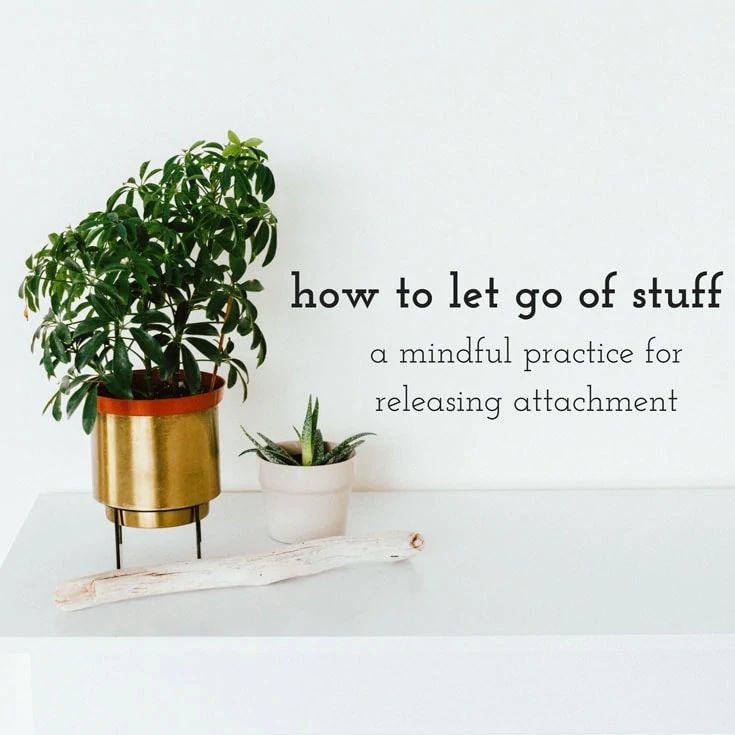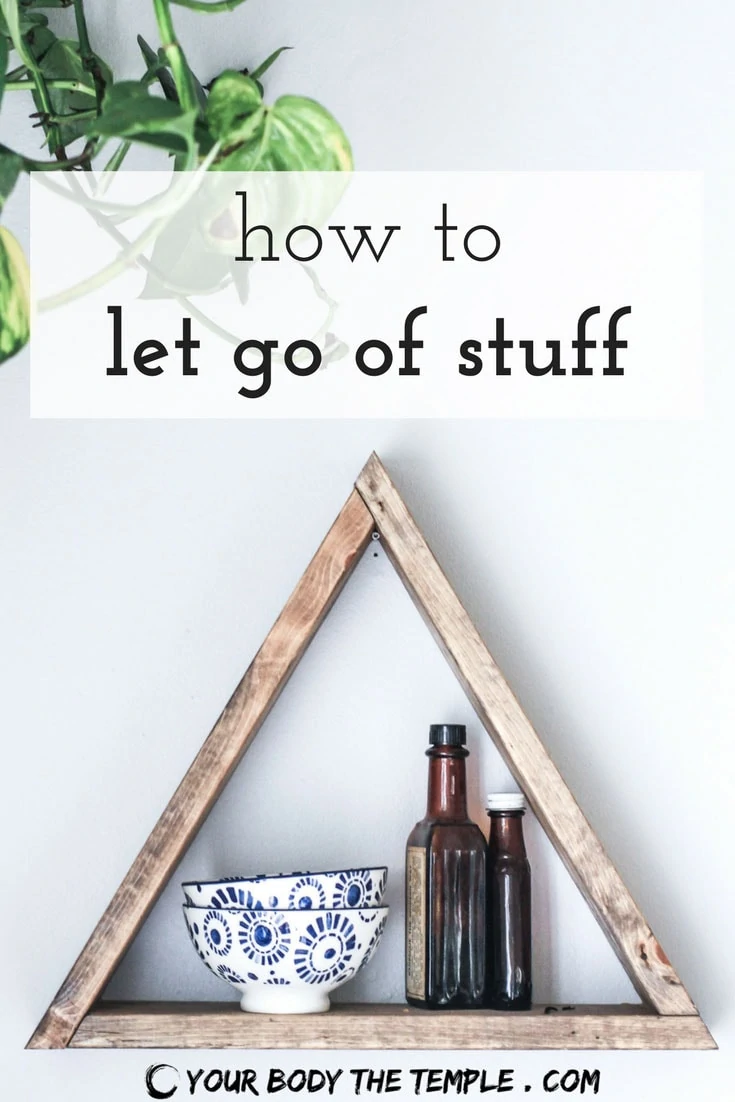How much stuff do you own? Could you itemize it, or even remember everything that’s in your home? Are there things that you neither love nor use? These are scary questions for a lot people and often comes up around having to let go of stuff.
With strong pressures from our consumer driven economy, many individuals have fallen into the habit of acquiring too many personal possessions.
Learning how to get rid of stuff can save you time, money, and most importantly – energy. It can improve your health and make your living space a more positive environment.
Cultivate mental peace, relaxation, and joy in your home by releasing your attachment to things and freeing yourself from the burden of excess possessions.
Understanding why you collect stuff
On the average day, you’re exposed from anywhere between 4,000-10,000 advertisements.
That’s a lot of sources telling you to buy!
Radio, television, social media, web browsing, shopping centres, billboards, even labels on clothing encourage consumerism.
Without a keen awareness of the marketing industry, it’s quite likely that you aren’t even aware of when you are being shown subliminal messages that encourage you to shop.
Not to mention the fact that you might be spending money to buy things you don’t need with money you don’t have. Recent trends have shown that the majority of Americans are in debt. At the national level, this represents $13 trillion of debt load.
Compulsive shopping is an uncontrollable spending habit that leads to the accumulation of lots of stuff. Shopoholics are often emotionally driven to buy. Shopping provides a rush that according to consumer psychologists is similar to a drug or alcohol high.
From a young age, you’re taught how to accumulate stuff, not how to get rid of stuff. Just think about some of the toys you received. Many of them likely encouraged collecting behavior such as dolls (and their wardrobes), sports cards, and cars. And although collecting itself isn’t bad, it can become a dangerous habit if it gets out of control and becomes compulsive.
How to stop accumulating stuff
When you are contemplating acquiring something new, it’s important that you train yourself to stop for a few moments and resist the impulses.
Step away from the situation and become present through conscious breathing and meditation. Calm your mind and tune your awareness into recognizing the habits and triggers for your buying trends.
Here are some useful tips to help you stop accumulating stuff:
- recognize how fortunate you are to own these things
- take notice that everything you own has come at a price to the planet
- assess your finances before you go shopping
- research the item that you want to avoid splurging on impromptu purchases
- see if you can borrow or rent items you won’t need long term
- invest in quality items you will use on a regular basis
- unsubscribe to newsletters or channels that send regular deals or promotions
- avoid the temptation of the sales rack
- see each purchase as a long-term investment and only buy things that are meant to last
- when you find something you want, give it a week before you commit to buying it
- make use of what you already have and love by not saving it just for special occasions
- if something is offered to you for free and you don’t need it, politely decline it
What is hoarding?
Having too much stuff in your home can become detrimental to your health, well-being, and even become a fire danger and tripping hazard.
When collecting becomes extreme, it can lead to compulsive hoarding tendencies.
Compulsive hoarding is the dangerous habit of accumulating stuff that offers little to no value or utility.
Close to 19 million Americans are hoarders, and experts say the numbers are only increasing.
This compulsive tendency to uncontrollably collect stuff also comes with a strong aversion to discard anything. This leads to the gathering of excess goods that often go unused.
Approximately half of the hoarding population has mental health issues such as depression, anxiety, or social phobias.
How to let go of stuff
Learning how to let go of material possessions can be challenging. Material possessions take up physical space and are visual reminders of memories, gifts, past purchases, even debt.
It can be difficult to start the purging process, but once you begin, you’ll find yourself energized and inspired.
Here are a few general rules to help you start distancing yourself from your possessions so that you can think clearly about which you wish to keep and which you can let go without mourning.
1. Recognize that it’s just stuff
One of the most important realizations you can come to when trying to purge is to acknowledging that all of these items are just stuff. Additionally, the vast majority of what you own isn’t a necessity, it’s a luxury.
Throw blankets on the couch, accent pillows, seasonal dishes, excess clothing, collectibles, these are all pleasantries that most people in the world will never experience.
Recognize that most of this is just stuff that you want as opposed to stuff that you really need. This humbling realization helps to remind you that more stuff doesn’t mean more joy.
2. Become aware that too much stuff can be dangerous to your health and well-being
Material possessions create increased surface areas to accumulate dust. Not only is this a pain for cleaning purposes but can also be detrimental to your health. According to the World Health Organization, dust is linked to many diseases such as cancer and asthma.
Too many belongings can become a fire hazard as well as a danger for children and animals. They can take up valuable space near critical exits, impede ventilation, and reduce air quality.
3. Begin to notice that material possessions take up time and space
It takes time to clean, organize, and manage your possessions.
Clothes need to be cleaned and cared for otherwise they look tired and lifeless. Collectibles need to be dusted or they appear dirty. Books and photos need to be stored correctly or they will fade and mildew.
Caring for your stuff takes up precious time and energy. By streamlining your possessions, you can free these valuable resources while enjoying your stuff more than ever.
4. Learn to appreciate what you already have before acquiring more
Before you decide to acquire new things, take inventory of what you already have.
Learn to cultivate gratitude for the material riches that are currently in your possession. Take pride in looking after them and being thankful for whatever good they bring into your life.
Focus on what you have instead of what you’re missing. Learn to distance yourself from the distractions that come in the form of advertising campaigns and social media.
5 Questions to consider while purging
There’s more to organizing than just finding a creative way to store more stuff.
Even if you can fit something in your home doesn’t mean you should keep it. Include only chosen pieces you have carefully selected in your living space. Meaning- keep only things that are important to you.
Use these questions as you consider which items you wish to let go:
- Utility: Is this item useful and still relevant to your life? To put it bluntly, do you need this?
- Versatility: Does this item get regular use or is it something you take out from storage once in a blue moon?
- Quality: Is this a quality item that will last and serve you for many years or will it need to be replaced after little use?
- Connection: What kind of connection do you have with this item? Are there any negative or unpleasant associations with it?
- Joy: Does it bring you joy or remind you of memories you would be better releasing?
How to let go of things you don’t need
An easy way to start letting go of material possessions is to start with things you don’t need.
Ask family, friends, or colleagues, if they can use any of the items you are looking to free yourself from. (Try to avoid guilting them into taking your belongings, but rather ask if they could use them.)
Another way to help get rid of stuff is to sell it in local classifieds. Be careful to set yourself a deadline for how long you are willing to keep an ad posted and diligent to stay with it. If the date passes and you haven’t sold the items, find alternative means to get rid of them such as donation or local recycling programs.
Be honest with yourself while sorting your items. Some might be worth recycling or repurposing. Others are just garbage and need to be disposed of accordingly.
How to let go of sentimental things
Sentimental things are often the hardest items to let go.
They might have belonged to a loved one or bring back memories of days long since passed.
It’s important that you remain mindful while sorting through things so you don’t become overwhelmed with floods of old memories or feeling guilted into keeping anything you don’t need or want.
Remember that the outdated piece of furniture that belonged to a grandparent, the old family photos you never look at, the baby clothes that have long since been overgrown, or even old school work it’s all just stuff.
Take some time to think about why you are holding on to these things. What kinds of thoughts and memories they are associated with? Do they still bring you joy?
Most importantly, in a week, month, or year from now, will you notice that they’re gone?
Reasons to consider getting rid of stuff
If you aren’t sure if something is worth keeping, ask yourself, why have you kept it?
Does it’s presence in your house bring you joy or is it just sitting there, unused, unloved, and collecting dust?
Here are some good reasons you might want to consider parting with certain possessions:
- you feel guilty that you spent money on it
- it was a gift
- you’re worried about how someone would feel if they knew you got rid of it
- you’ve already had it for so long that you can’t be bothered moving it
- it’s difficult to keep clean
- it’s in need of repair
- it serves no utility
- it’s outdated and you have other things to serve its function
- it’s taking up space
- someone else could use it
When there is an emotional attachment to stuff, it makes it much more challenging to let go. But at the same time, it is important to not let things clutter your space and weigh heavy on your mind.
For many people the first step in this process is releasing the guilt that comes from feeling like you have to keep things for some reason other than your own enjoyment.
How letting go of clutter can help you cultivate mental peace
As a species, we are hardwired to respond positively to neat and orderly environments.
Untidy spaces, filled with excess stuff create a chaotic environment both in your home as well as in your mind. It’s distracting, visually unappealing, and can be an upsetting reminder of extra work you need to do.
Clutter can increase stress levels, reduce your ability to concentrate, and negatively impact your sleep. It also reduces your creativity and productivity by reducing the amount of clean open space for brainstorming. Furthermore, it puts your mind in sensory overload from the sights, smells, and stimuli from these unnecessary things.
If you’re someone who struggles to keep your home orderly, you might also feel guilt or embarrassment from the mess. Reducing the amount of material things you possess can dramatically reduce your cleaning time and help you keep organized.
By getting rid of things that clog your living space, you create room to breathe, relax, and enjoy. You free yourself from attachment and learn to keep only the items that inspire positivity in your life. It also helps you cultivate mental peace by eliminating unnecessary stressors and creating a calm environment.
Take away
The process of letting stuff go is both a mental and physical cleansing process.
It helps you to release your attachment to material possessions, reduce unnecessary stress, cultivate a peaceful living space, and make you more grateful for what you already have.
Furthermore, by becoming aware of why you accumulate things, you can learn to become less focused on materialistic highs and channel your energy into fostering joy wherever you are regardless of your possessions at any given moment.
There will always be a strong temptation to buy, collect, and acquire goods. Becoming mindful of the fact that more stuff will not bring more happiness is a great awakening.
Embark on a liberating journey of learning how to let go of stuff, one breath at a time.
Photos by Liana Mikah and Kara Michelle


